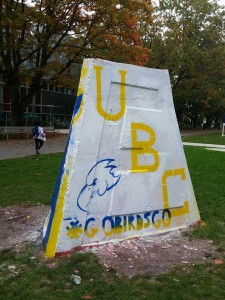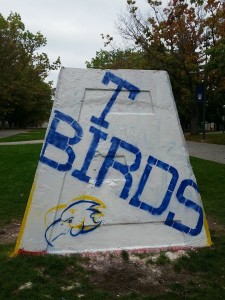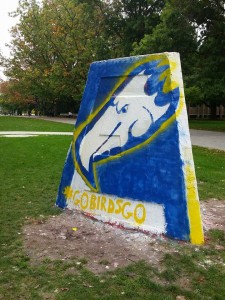In Dorothy Smith’s piece ‘The Everyday World as Problematic’ the author discusses her observations of they in which norms, or the social expectations that govern our behaviour, are interconnected to form large webs of structures and settings. Smith argues that “the single case has no significance unless it can in some way or another be extrapolated to some general statement about society or some subgroup represented methodologically as a population of individuals” (p. 571). I believe my experience as both a varsity athlete and attending my first every Thunderbird Athletes Council (TAC) weekly meeting provided some context and personal application to what Smith is proposing. Student athletes at UBC are in a very unique position in comparison to other students, a position that comes with both undeniable privilege yet massive expectations that require tremendous commitment and accountability.
My experience at the TAC meeting was a first me, even though I have been a member of the Varsity Women’s Volleyball Team for four years. The TAC acts as a student-athlete lead student council that meets weekly with two representatives from each other the 27 varsity teams on campus. The meeting consists of each team present quickly recapping their past week with results from competitions or updates on training. Each team is invited to nominate a team member (or any athlete for that matter) for Athlete of the Week, which is then voted on by all those present. The TAC council, which consists of five elected members (President, Secretary, Treasurer, Events Coordinator and Social Media) from various teams, then addresses upcoming events (club events, Christmas parties, fundraisers etc.) or any other announcements and housekeeping matters. The group was then addressed by two guests, one from Recreation and one from the Athletic Department. The meeting concluded with members of a particular team nominating their teammate to be featured in a section of the Student-Athlete Newsletter called “A Little Birdy Told Me”, which basically simulates a playful gossip column in which teammates can share anonymous tidbits of info about their teammates. This section usually consists of romantic endeavours between athletes or anonymously selling out teammates for embarrassing nights out. Most of the submissions are harmless, playful and good for a quick chuckle but there is no denying the heteronormative undertones of the obsession with heterosexual pairings and their sexual exploits together.
I believe it is aspects like “A Little Birdy Told Me” that creates an image of varsity athletes on a college campus that gives other students presumptuous perspectives about the identities of student-athletes. The Student-Athletes Newsletter which features this trivial section is only sent out to those belonging to a varsity team, and is not easily available to members of the student body at large. However its premise is what I believe hinders varsity athletes from connecting with other students and further encourages students to continue to be disconnected and disinterested with UBC’s sport culture. This lack of investment students feel to the sports team on campus is something that is equal parts frustrating and puzzling for a student-athlete like myself.
I am one student athlete among many I know would love nothing more than to have students their my classes see my varsity branded t-shirts and jackets and instead of rolling their eyes, ask me what team I play for or even better tell me they want to come to a game this weekend. I believe students see my team gear (which I personally avoid wearing to class for these reasons) and make a host of assumptions about my privileged position on campus and presumed sense of individual entitlement. I believe what Dorothy Smith has to say about a single case having no generalizing significance would resonate with a lot of student athletes who are very eager to reach out to the general student body.
There is no denying that being a student-athlete has its privileges and perks. However it comes, in my biased opinion, at a massive investment and price. Student-athletes on average train/practice 6 days a week, travel every other weekend for competitions across Canada and in the states, have weekly team meetings, video meetings, weight-room sessions, conditioning sessions, team community service, athletic therapy and then actual games/competitions. In the average week on the volleyball team we put in 40+ hour weeks, equivalent to a full-time job, and we still go to school full-time and some athletes even work part time. We do it for a host of different reasons, some would not have the opportunity to get a degree without sport propelling their education, some want to continue on and play professional sports or compete in the Olympics (some do, most don’t), some consider it a huge accomplishment, some do it for a sense of community, to make friends, to have a place to belong, some do it because of pressure from family, but we all do it because at some point or another we fell in love with a game and fell hard. Whether that game be running around a giant circle as fast as possible or trying to keep a ball off the floor, we love it regardless of how illogical it all is. Despite the knee surgeries, the lack of sleep, the coaches we don’t understand, the mandatory ice baths and the 7AM conditioning sessions, at the end of the day it is a choice, and everyday sore as ever we make it over and over again.
We do not expect our fellow students to idolize us, like we see in U.S. NCAA college sports. We are just trying to get by, so if you are our TA and we have to miss the midterm because we have to fly to Regina in -40 degree weather to play two matches back to back, please understand we truly appreciate your flexibility and consideration. If you sit next to us in class and I’m still sweating because my coach forgot to let me out early and I ran all the way from the stadium to the ANSO building to try to get to class on time, I apologize for the smell and for the panting. Please understand I do not actually think my life is like Blue Mountain State or Friday Night Lights (trust me no one on the football team looks like Tim Riggins). Believe me when I say I love wearing my Blue & Gold and Thunderbird jackets not because I think my shit doesn’t stink but because I love representing our school and am very proud and feel very fortunate to get the opportunity to play the sport I love and get a degree from UBC at the same time, its incredible. I want to be apart of making the UBC experience more than just about grades, finishing assignments and future job opportunities. I would love it if you came to a game, just one, doesn’t even have to be my game, our basketball teams play this weekend and my roommate is #7 and she’d love to see you in the stands.
I identify as an athlete. Not because I agree with the harm sports brings to men who struggle to live up to a glorified hegemonic masculinity or the fact that Maria Sharapova is one of the most incredible female athletes who gets more comments on her choice of skirt as opposed to her performance at Wimbledon. I identify as an athlete because my coach’s partner is a UBC Poli Sci prof and he helped me pick courses which eventually lead me to sociology a discipline I love. I identify as an athlete because in the 70s women fought for me and my teammates to have the same rights as men in college sports. I identify as an athlete because a couple of decades ago there wouldn’t have been the resources or the funding for me to.
Smith, Dorothy (1987/2012). From “The Everyday World As Problematic.” In Scott Appelrouth and Laura Desfor Edles. Classical and Contemporary Sociological Theory (2nd Edition). Thousand Oaks, CA: SAGE Pine Forge Press Pp. 570-3.


